European Platform for Digital Humanism
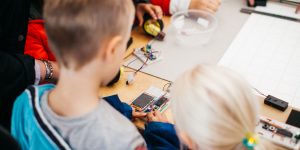
STEAM alignment across different educational levels at the University of Amsterdam
University of Amsterdam (NL)
This approach to STEAM education covers two programmes taught at the University of Amsterdam (UvA): the BSc Information Studies (three years) and the MSc Information Studies (one year) which are both located in the Computing Department. The approach provides students on both levels with room for exploration of the field based on shared activities mainly through project work. The aim is to provide students with technological, human and societal insights (theories, models, system implementations) so that they can comprehend and place themselves in the field of information science. The programmes are aimed at students from a mixture of subject backgrounds but joined in the desire to solve complex societal problems, using ICT and digital media.
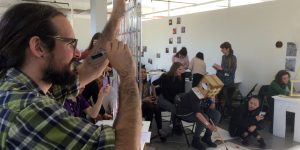
A Hybrid STEAM approach from the MA Art and Science at Central Saint Martins
University of the Arts London: Central Saint Martins (UK)
The MA Arts and Science (MAAS) is a two-year Master's programme, founded in 2011, recruiting students from different disciplinary backgrounds across the arts, sciences and humanities. The course builds a STEAM community utilising a shared studio space as a resource and setting for collaboration and cooperation. The philosophy of the course brings together different knowledges and aims to create a non-hierarchical platform for students, disciplines and methods.
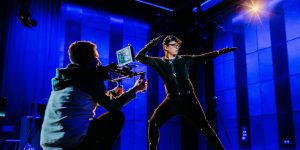
STEAM Education in Europe II
Participating Gardens: Birmingham - STEAMhouse, Castelo di Rodrigo - Open Science Hub, European Platform for Digital Humanism - Creative School
What constitutes creativity and imagination is a potentially contentious point, yet an outlook that focuses on areas of intersection between the arts and sciences can lead to certain, tangible benefits. These can include techniques for collaborating across disciplines, an ability to consider varied perspectives, and skills in identifying points of common ground. Such competencies are combinatorial in nature, and if integrated into a higher education curriculum, will lead to an acceleration in transdisciplinary innovation. Join us in our Birmingham Garden as we explore approaches to STEAM education with some of the leading transdisciplinary institutions in Europe.
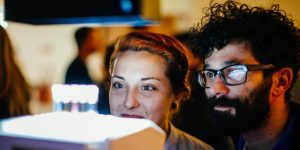
STEAM Approaches at Science Gallery at Trinity College Dublin
Science Gallery at Trinity College Dublin (IE)
Science Gallery Dublin was founded at Trinity College Dublin, the University of Dublin in 2008, with a mission to ignite creativity and discovery where science and art collide.
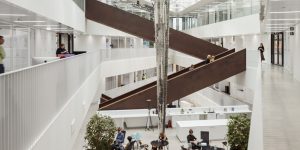
Arts for All: Aalto University-Wide Art Studies
Aalto University (FI)
The University-Wide Art Studies (UWAS) programme at Aalto University offers all students, irrespective of discipline, the chance to explore and study art and design-based practices and processes. This is a vehicle for the wider ambition of the institution to encourage the formation of transdisciplinary communities of teachers, students and researchers, with a view to tackling global challenges in imaginative and meaningful ways. There is an understanding that art and design should be considered to have a deeper purpose than the simply aesthetic: creativity can help society to be renewed.
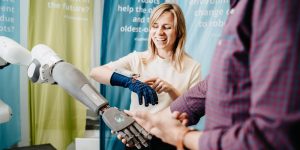
STEAM Approaches at Technische Universität Dresden
Technische Universität Dresden (DE)
The Technische Universität Dresden presents a number of approaches that employ concepts closely connected to STEAM and are transferred into/developed for teaching.
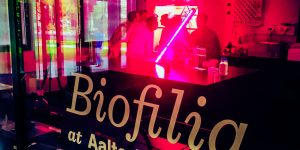
Aalto Biofilia: A journey into the biological arts
Aalto University (FI)
Biofilia is a technical facility at Aalto University for studies in the biological arts as a fast-emerging area of interest that fits succinctly with STEAM approaches in artistic practice. It adopts transdisciplinary knowledge sharing to research and curriculum development to explore the intersection between biosciences, engineering and the arts.
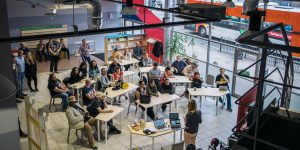
STEAM Fellows in Conversation
Steve Harding (UK)
Meet Dr Steve Harding, coordinator of BCU’s STEAM Fellows Programme, as he talks with Mark Brill (Art, Design, Media), Kusminder Chahal (Business, Law, Social Sciences) and Tychonas Michailidis (Computing, Engineering, Built Environment) about their transdisciplinary projects and how they will help to stimulate engagement across the University.
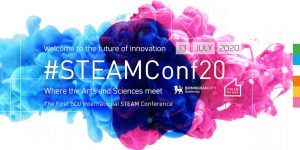
Oh My, What Now?
David Gillette (US)
Dr David Gillette from California Polytechnic State University San Luis Obispo delivers the keynote presentation for First BCU International STEAM Conference on future-focused storytelling, interactive design and sustainable futures. Dr Gillette is founder and Co-Director of the Liberal Arts and Engineering Programme at Cal Poly.

Thinking Deeper with STEAM
Rehan Bhana (UK)
Explore connections between academia and industry, learning about our PhD Hub and how STEAM thinking can help businesses tackle challenges through developing deeper perspectives, with Rehan Bhana, Associate Professor at BCU.
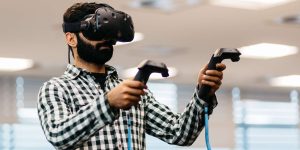
Extending Reality: Introducing the Past, Present and Future of Immersive Media
Adam Paigge (UK)
Join STEAMhouse Extended Reality Technician Adam Paigge in his talk about XR, how this can support STEAM collaboration and the ways in which STEAMhouse is leading such approaches in the West Midlands.

A Theory of Change
Anne Nigten (NL)
The STARTS Prize is an annual European prize for innovative projects at the interface of Science, Technology, and the ARTS. This article reflects on the most striking outcomes of a study that was conducted in the spring of 2020, to evaluate the first three STARTS Prize editions. The STARTS Prize aims to promote art as a catalyst for change and innovation in the fields of technology, science and the social sphere. It has mobilized an impressive number of artists, designers and engineers and built a strong brand in recent years.
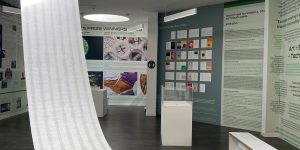
Mapping Collaborative Practice
Denise Doyle (UK), Richard Glover (UK), Martin Khechara (UK), Christian Cherene (ES), Norma Deseke (DE), Pei-Ying Lin (TW), Miranda Graaf (NL), Giulia Tomasello (IT), Tommaso Busolo (IT)
Interdisciplinary collaboration across the arts and sciences can create friction and uncertainty between creative partners from different backgrounds. How can we overcome these moments, and are they integral to any collaborative or emergent process? What role does art and science collaboration have in addressing global challenges in 2020? Chaired by Richter Glover and Martin Khechara, participants and researchers of the University of Wolverhampton’s STARTS Methodologies research project take part in this digital exchange of ideas.
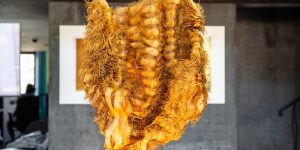
STARTS Prize Exhibition Tour
The annual STARTS Prize Exhibition presents a selection of current best practice examples at the intersection of science, technology and the arts. Kristina Maurer and Karla Spiluttini take the viewers on a journey through this year’s exhibited projects in Kepler’s Garden. From circular economy to the relationship between ecology and technology, through digital humanism and empathic approaches to artificial intelligence, the exhibition shows the outstanding diversity of artistic practice in the STARTS field.

Salon Universitas
Melanie Baumgartner (AT), Florian Hartmann (AT), Christoph Guger (AT), Markus Hohenwarter (AT), Alicia Hofstätter (AT), Corinna Hörmann (AT), Martina Mara (AT), Kathrin Meyer (DE), Christopher Lindinger (AT)
This session brings together four of the exhibited teams – the LIT Robopsychology Lab, the JKU Linz School of Education, the LIT Soft Material Lab and the Institute for Integrated Circuits and their collaborative partner g.tec Medical Engineering – to discuss their creative process and prototype development.

Building Interdisciplinary Communities
Deborah Hustic (HR)
Hear from Deborah Hustic, Artistic Director at Radiona makerspace in Zagreb, Croatia, as she outlines her work in STEAM, making and creative investigation.

First BCU International STEAM Conference
STEAMhouse, Birmingham City University (UK)
Aimed at all those curious about cross-disciplinary thinking, researchers, innovators, industrial leaders, artists, scientists, technologists, engineers, mathematicians and those not bounded by their sectors, joined the First BCU International STEAM Conference in July 2020.

STARTS Prize Forum: Andrea Ling
Andrea Ling (CA)
Andrea Ling, winner of this year’s Grand Prize for Artistic Exploration, introduces her winning project “Design by Decay, Decay by Design”, a series of artifacts that exhibit designed decay developed for the 2019 Ginkgo Bioworks Creative Residency on how to design a world without waste and talks about her artistic and creative process.
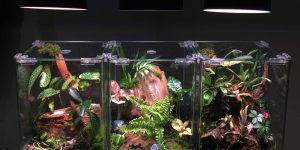
STARTS Prize Forum: Olga Kisseleva
Olga Kisseleva (RU)
Olga Kisseleva (RU), winner of this year’s Grand Prize for Innovative Collaboration, and Andrea Ling (CA), winner of the Grand Prize for Artistic Exploration, give insight into their practice.
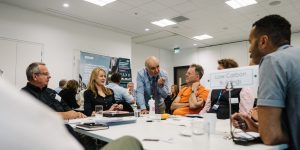
STEAMhouse: Make to Innovate
Clayton Shaw (UK), James Hannam (UK)
In this presentation from the First BCU International STEAM Conference you will learn about STEAMhouse, BCU’s centre for collaborative innovation, through an introductory talk from Programme Manager Clayton Shaw and Prototyping & Operations Manager James Hannam.


